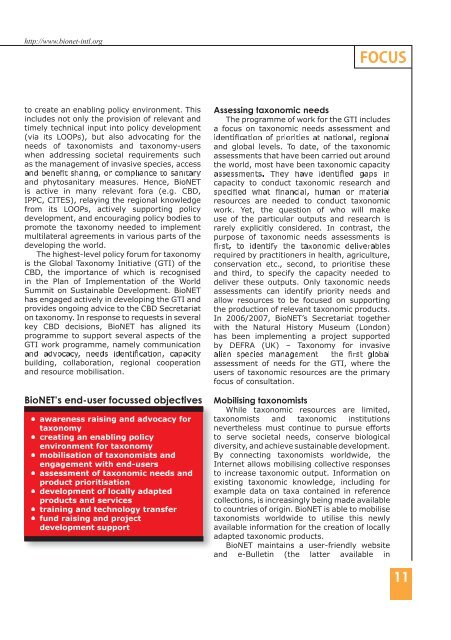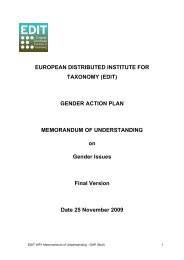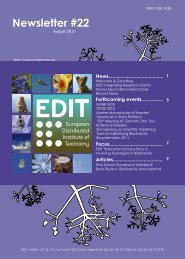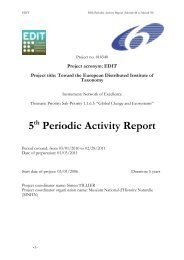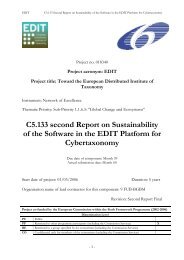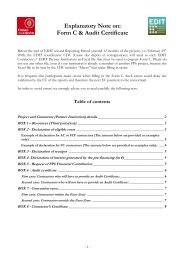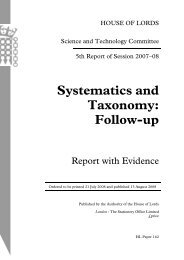Newsletter #5 - EDIT | - European Distributed Institute of Taxonomy
Newsletter #5 - EDIT | - European Distributed Institute of Taxonomy
Newsletter #5 - EDIT | - European Distributed Institute of Taxonomy
You also want an ePaper? Increase the reach of your titles
YUMPU automatically turns print PDFs into web optimized ePapers that Google loves.
http://www.bionet-intl.org<br />
<br />
to create an enabling policy environment. This<br />
includes not only the provision <strong>of</strong> relevant and<br />
timely technical input into policy development<br />
(via its LOOPs), but also advocating for the<br />
needs <strong>of</strong> taxonomists and taxonomy-users<br />
when addressing societal requirements such<br />
as the management <strong>of</strong> invasive species, access<br />
phytosanitary measures. Hence, BioNET<br />
is active in many relevant fora (e.g. CBD,<br />
IPPC, CITES), relaying the regional knowledge<br />
from LOOPs, actively supporting policy<br />
development, encouraging policy bodies to<br />
promote the taxonomy needed to implement<br />
multilateral agreements in various parts <strong>of</strong> the<br />
developing the world.<br />
The highest-level policy forum for taxonomy<br />
is the Global <strong>Taxonomy</strong> Initiative (GTI) <strong>of</strong> the<br />
CBD, the importance <strong>of</strong> which is recognised<br />
in the Plan <strong>of</strong> Implementation <strong>of</strong> the World<br />
Summit on Sustainable Development. BioNET<br />
has engaged actively in developing the GTI and<br />
provides ongoing advice to the CBD Secretariat<br />
on taxonomy. In response to requests in several<br />
key CBD decisions, BioNET has aligned its<br />
programme to support several aspects <strong>of</strong> the<br />
andbenefitsharing,orcompliancetosanitary<br />
GTI work programme, namely communication<br />
Assessing taxonomic needs<br />
The programme <strong>of</strong> work for the GTI includes<br />
a focus on taxonomic needs assessment and<br />
identification<strong>of</strong>prioritiesatnational,regional<br />
and global levels. To date, <strong>of</strong> the taxonomic<br />
assessments that have been carried out around<br />
the world, most have been taxonomic capacity<br />
capacity to conduct taxonomic research and<br />
assessments.Theyhaveidentifiedgapsin<br />
resources are needed to conduct taxonomic<br />
work. Yet, the question <strong>of</strong> who will make<br />
use <strong>of</strong> the particular outputs and research is<br />
rarely explicitly considered. In contrast, the<br />
purpose <strong>of</strong> taxonomic needs assessments is<br />
specifiedwhatfinancial,humanormaterial<br />
required by practitioners in health, agriculture,<br />
conservation etc., second, to prioritise these<br />
and third, to specify the capacity needed to<br />
deliver these outputs. Only taxonomic needs<br />
assessments can identify priority needs and<br />
allow resources to be focused on supporting<br />
the production <strong>of</strong> relevant taxonomic products.<br />
In 2006/2007, BioNET’s Secretariat together<br />
with the Natural History Museum (London)<br />
has been implementing a project supported<br />
by DEFRA (UK) – <strong>Taxonomy</strong> for invasive<br />
first,toidentifythetaxonomicdeliverables<br />
building, collaboration, regional cooperation<br />
resource mobilisation.<br />
andadvocacy,needsidentification,capacity<br />
BioNET’s end-user focussed objectives<br />
awareness raising and advocacy for<br />
•taxonomy<br />
creating an enabling policy<br />
•environment for taxonomy<br />
mobilisation <strong>of</strong> taxonomists and<br />
•engagement with end-users<br />
assessment <strong>of</strong> taxonomic needs and<br />
•product prioritisation<br />
development <strong>of</strong> locally adapted<br />
•products and services<br />
training and technology transfer<br />
•fund raising and project<br />
•development support<br />
assessment <strong>of</strong> needs for the GTI, where the<br />
users <strong>of</strong> taxonomic resources are the primary<br />
focus <strong>of</strong> consultation.<br />
alienspeciesmanagementthefirstglobal<br />
Mobilising taxonomists<br />
While taxonomic resources are limited,<br />
taxonomists and taxonomic institutions<br />
nevertheless must continue to pursue efforts<br />
to<br />
serve societal needs, conserve biological<br />
diversity, and achieve sustainable development.<br />
By<br />
connecting taxonomists worldwide, the<br />
Internet allows mobilising collective responses<br />
to<br />
increase taxonomic output. Information on<br />
existing taxonomic knowledge, including for<br />
example data on taxa contained in reference<br />
collections, is increasingly being made available<br />
to<br />
countries <strong>of</strong> origin. BioNET is able to mobilise<br />
taxonomists worldwide to utilise this newly<br />
available information for the creation <strong>of</strong> locally<br />
adapted taxonomic products.<br />
BioNET maintains a user-friendly website<br />
and<br />
e-Bulletin (the latter available in<br />
11


